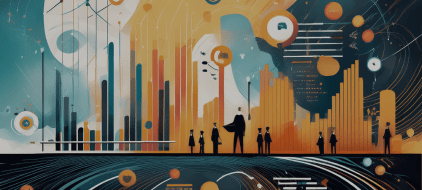The Impact of Big Data on Sales Strategies: When Data Meets Dollars
In the ever-evolving world of business, one thing is certain: data is king. But not just any data. We're talking about Big Data—those massive, unwieldy mountains of information that make your standard spreadsheet look like a child’s coloring book. In this digital age, Big Data is transforming sales strategies in ways that even Nostradamus couldn't have predicted. So, grab your calculators and put on your data scientist hats, as we embark on a humor-laden journey through the impact of Big Data on sales strategies.
The Rise of Big Data: Bigger than Bigfoot
Let's start with a little history lesson. Once upon a time, sales strategies were crafted with gut feelings, a sprinkle of intuition, and maybe a lucky rabbit's foot. Salespeople were like knights on a quest, armed only with their charm and a list of leads. Then came Big Data, swooping in like a superhero with a spreadsheet cape.
Big Data isn't just big—it's enormous. We're talking about zettabytes (that’s a billion terabytes, for those keeping score at home). With every click, swipe, like, and share, data is generated at a mind-boggling rate. Companies realized that hidden within this avalanche of information were golden nuggets of insight just waiting to be mined. And so, the data revolution began.
From Gut Feelings to Data-Driven Decisions
Gone are the days when sales strategies were based on the whimsical gut feelings of your top salesperson who swears by his morning coffee's clairvoyant properties. Now, it's all about data-driven decisions. Why trust your gut when you can trust a pie chart, right?
Predictive Analytics: Fortune-Telling for Salespeople
Predictive analytics is like having a crystal ball, but instead of a mystical gypsy, you have a team of data scientists crunching numbers. By analyzing past data, predictive analytics can forecast future trends and behaviors. Imagine knowing which leads are most likely to convert before you even pick up the phone. It’s like having the answers to the test, but without the guilt of cheating.
Customer Segmentation: Divide and Conquer
Big Data allows for hyper-specific customer segmentation. Gone are the days of broad, one-size-fits-all marketing. Now, you can divide your customer base into tiny, manageable segments. Want to target left-handed, vegan, yoga-loving millennials who binge-watch sci-fi shows on weekends? No problem. Big Data's got you covered. It’s like playing a game of "Guess Who?" but with way too much information.
The Tools of the Trade: Gadgets for Data Wizards
With great data comes great responsibility—and a plethora of tools to manage it. Let's look at some of the essential gadgets in the data wizard's toolkit.
Customer Relationship Management (CRM) Systems
CRM systems are the Swiss Army knives of sales strategy. They manage customer interactions, track sales, and store all that juicy data in one place. It's like having a digital butler who remembers everything about your customers, from their favorite color to their dog's name. Popular CRMs like Salesforce and HubSpot are the go-to choices for businesses that want to turn data into dollars.
Data Visualization Tools
Even the most robust data sets are useless if they look like a jumbled mess. Enter data visualization tools like Tableau and Power BI. These tools turn raw data into beautiful, easy-to-understand charts and graphs. It's like turning a pile of Lego bricks into a masterpiece. With the right visualization, you can spot trends, outliers, and opportunities faster than you can say "bar chart."
Machine Learning Algorithms
Machine learning is the secret sauce that makes Big Data truly powerful. These algorithms learn from past data to make predictions about the future. It’s like having a super-smart intern who never sleeps and gets smarter every day. Machine learning can identify patterns that humans might miss, making it an invaluable tool for sales strategies.
Real-Life Impact: When Data Dances with Dollars
The impact of Big Data on sales strategies isn't just theoretical—it’s very real and sometimes quite entertaining. Let’s dive into a few examples.
The Tale of the Smart Fridge
Imagine a world where your fridge knows when you're out of milk and orders more for you. This isn't the plot of a sci-fi movie—it’s the power of Big Data. Appliance companies use data to understand usage patterns and predict when customers will need to restock. By analyzing data from smart fridges, companies can send timely promotions and reminders, ensuring customers never run out of their favorite products.
The Case of the Predictive Coupon
Retailers have gotten really good at using Big Data to predict what you’ll buy next. In one famous case, a well-known retailer used data to predict a customer's pregnancy before she even announced it. By analyzing purchasing patterns, they sent her targeted coupons for baby products. While this level of insight can be a bit creepy, it’s undeniably effective.
The Legend of the Hyper-Personalized Email
Email marketing used to be a numbers game: send enough emails and hope some stick. But with Big Data, emails can be hyper-personalized. Companies can track every click and interaction, tailoring their messages to individual preferences. If you’ve ever received an email that felt eerily specific, you’ve experienced the magic of Big Data. It’s like having a sales rep who knows you better than your best friend.
The Lighter Side of Big Data: Hiccups and Humorous Moments
Of course, with great power comes great potential for hilarity. The world of Big Data isn't without its hiccups and humorous moments.
The Overzealous Recommendation Engine
Recommendation engines powered by Big Data can be a blessing—until they go overboard. Imagine buying a lawnmower online and then being bombarded with ads for lawnmowers for the next six months. Thanks, but one lawnmower is enough. This overzealousness can lead to some amusing (and annoying) experiences.
The Mysterious Case of the Missing Data
Big Data relies on, well, data. But sometimes data goes missing, leading to baffling conclusions. A company once used data to predict that an uptick in ice cream sales would lead to more drownings. Turns out, both were just more common in the summer. Correlation doesn’t always equal causation, but it sure can lead to some funny findings.
The Privacy Paradox
As data collection becomes more sophisticated, privacy concerns grow. Imagine a smart toilet analyzing your health data and sending dietary recommendations. While potentially useful, it’s also a bit too invasive for comfort. Navigating the balance between useful data and privacy can lead to some eyebrow-raising moments.
Best Practices: Navigating the Big Data Jungle
So, how can you harness the power of Big Data without getting lost in the jungle? Here are some best practices to keep in mind.
Focus on Quality, Not Quantity
It’s tempting to collect as much data as possible, but quality trumps quantity. Clean, accurate data is more valuable than a massive, messy data set. Make sure your data collection methods are robust and that you’re focusing on the right metrics.
Keep it Ethical
With great data comes great responsibility. Always prioritize customer privacy and data security. Be transparent about your data collection methods and ensure that your practices comply with relevant regulations.
Use Data to Enhance, Not Replace, Human Interaction
Big Data is a powerful tool, but it’s not a replacement for human interaction. Use data to enhance your sales strategies, but don’t lose sight of the importance of personal connections. At the end of the day, people buy from people.
Continuously Learn and Adapt
The world of Big Data is constantly evolving. Stay up to date with the latest tools, technologies, and trends. Be willing to adapt and refine your strategies as new insights emerge.
Conclusion: The Future is Data-Driven
Big Data has fundamentally transformed sales strategies, bringing new levels of precision, personalization, and prediction. While the journey from gut feelings to data-driven decisions has had its fair share of hiccups and humorous moments, the benefits are undeniable. By embracing Big Data and leveraging the right tools and strategies, businesses can boost productivity, enhance customer engagement, and drive revenue growth.
As we move forward, the role of Big Data in sales will only continue to grow. So, whether you’re a seasoned data scientist or a sales rep just dipping your toes into the data pool, remember: the future is data-driven, and the possibilities are endless. Just don’t forget to enjoy the ride—and maybe laugh a little along the way.







